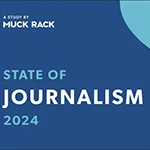 |
Americans increasingly expect CEOs to be activists as well as managers, according to research just released by Weber Shandwick.
The results of “CEO Activism in 2018: The Purposeful CEO,” the agency’s third annual nationwide poll on CEO activism, show that the public is both becoming more aware of CEO activism and more supportive of the idea—especially when that activism takes the form of a CEO defending a company’s values.
Out of the 1,006 U.S. adults age 18 or over who were surveyed, 42 percent said that they have either heard or read about CEOs taking positions on controversial issues. That’s a five percent hike from 2017, and eight percentage points up from 2016’s figure of 34 percent. Respondents also said that they expect the number of CEO activists to grow, with 46 percent predicting an increase over the next few years.
When it comes whether or not they think CEO activism is a good thing, 38 percent of survey respondents said that they have a favorable view of CEOs voicing their opinion on hotly debated topics, with 25 percent saying that they took a negative view of the trend. In 2017 and 2016, just 31 percent of those surveyed were in favor of CEO activism.
Perceptions of the political influence of CEO activism are also on the rise. Nearly half (48 percent) of those surveyed said they felt the opinions voiced by CEOs did have an influence on the government, up 10 percent from 2017.
Party affiliation did not seem to be a major indicator of how effective CEO activism was deemed to be: 54 percent of respondents who said they were Democrats saw it as influential, as opposed to 51 percent for Republicans. Independents were a bit more skeptical, with just 43 percent finding CEO activism influential.
 |
The proper scope of CEO activism was the source of some conflict, however. When respondents were asked if CEOs should take positions on social issues—even if those issues were not directly related to their business—64 percent of Democrats agreed, while only 44 percent of independents and 32 percent of Republicans approved.
The workplace-related topics that respondents took a positive view of CEOs weighing in on were: jobs skills/training (80 percent), equal pay in the workplace (79 percent), sexual harassment (77 percent), privacy and personal data protection (71 percent), healthcare coverage (70 percent) and maternity/paternity leave (69 percent)
Quite likely the most important effect a CEO’s activism can have is in its influence on purchasing behavior. For respondents who were aware of CEO activism, 35 percent said they decided not to buy from a company, or to boycott that company, based on a CEO’s stance regarding a particular issue. In 2017, that number was 28 percent. Those who made a positive purchasing decision in response to CEO activism was 18 percent, even with 2017’s number.
“Over the past 12 months, it has become more common for leaders of companies to speak out on policy issues, and the American public is paying attention to this new brand of CEO,” said Weber Shandwick CEO Andy Polansky. “While most CEOs are not accustomed to participating in the political arena, they and their companies need to be prepared to navigate these uncharted waters, whether they remain silent or not.
To see the full study, go to Weber Shandwick’s website.


 Consumers who once demanded convenience now require consistent, multi-channel experiences that cater to them at every point. Brands must have a clear, audience-appropriate, and channel-specific voice across all platforms.
Consumers who once demanded convenience now require consistent, multi-channel experiences that cater to them at every point. Brands must have a clear, audience-appropriate, and channel-specific voice across all platforms. Employees at U.S. companies are experiencing high levels of burnout, but managers are lagging behind when it comes to their awareness of the problem
Employees at U.S. companies are experiencing high levels of burnout, but managers are lagging behind when it comes to their awareness of the problem Brand has a powerful effect on a company’s valuation, but the level of brand understanding in the investment community leaves a lot to be desired, according to a new study from Brodeur Partners, Interbrand and NewtonX.
Brand has a powerful effect on a company’s valuation, but the level of brand understanding in the investment community leaves a lot to be desired, according to a new study from Brodeur Partners, Interbrand and NewtonX. AI may still be viewed with a wary eye by most media pros, but its use is growing, according to a new study from Muck Rack.
AI may still be viewed with a wary eye by most media pros, but its use is growing, according to a new study from Muck Rack. A new study from Walker Sands says that some marketers have been putting the cart before the horse when it comes to the relationship between marketing channels and business outcomes.
A new study from Walker Sands says that some marketers have been putting the cart before the horse when it comes to the relationship between marketing channels and business outcomes.


 Have a comment? Send it to
Have a comment? Send it to 
No comments have been submitted for this story yet.